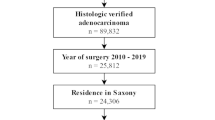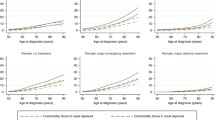Abstract
Objective
To evaluate the outcomes of non-metastatic colon cancer patients in relation to the socioeconomic status (SES) at diagnosis based on the Surveillance, Epidemiology, and End Results (SEER) census tract level-SES database.
Methods
SEER SES census tract level database represents a specially designed database to integrate different aspects of SES among cancer patients. It reports a composite SES index for each patient. Patients were then stratified into three SES groups. Patients with a non-metastatic colon cancer diagnosis, diagnosed (2004–2015), and who were included in this specialized database were included in the current study. Multivariate Cox regression analysis was used to assess the impact of SES index on colon cancer-specific survival.
Results
A total of 80,121 patients with non-metastatic colon cancer were included in the current study. Comparing patients in the lower SES group with patients in the higher SES group, patients with lower SES were more likely to have a younger age at presentation (P < 0.001), black race (P < 0.001) and more advanced stage at presentation (P < 0.001). The impact of the SES on colon cancer-specific survival was evaluated through multivariate Cox regression analysis adjusted for age, sex, race, stage, and colon cancer side. Lower SES was associated with worse colon cancer-specific survival (hazard ratio for group 1 versus group 3: 1.257; 1.190–1.328; P < 0.001). Interaction testing between race (black race versus white race) and SES was non-significant (P = 0.932).
Conclusions
Lower SES is associated with worse colon cancer-specific survival among non-metastatic colon cancer patients.
Similar content being viewed by others
References
Clegg LX, Reichman ME, Miller BA et al (2009) Impact of socioeconomic status on cancer incidence and stage at diagnosis: selected findings from the surveillance, epidemiology, and end results: National Longitudinal Mortality Study. Cancer Causes Control CCC 20(4):417–435
Link BG, Phelan JC (1996) Understanding sociodemographic differences in health–the role of fundamental social causes. Am J Public Health 86(4):471–473
Stover GN (2009) Social conditions and health. Am J Public Health 99(8):1355
Zhang Q, Wang Y, Hu H et al (2017) Impact of socioeconomic status on survival of colorectal cancer patients. Oncotarget 8(62):106121–106131
Manser CN, Bauerfeind P (2014) Impact of socioeconomic status on incidence, mortality, and survival of colorectal cancer patients: a systematic review. Gastrointest Endosc 80(1):42–60.e9
Yost K, Perkins C, Cohen R et al (2001) Socioeconomic status and breast cancer incidence in California for different race/ethnic groups. Cancer Causes Control 12(8):703–711
Yu M, Tatalovich Z, Gibson JT et al (2014) Using a composite index of socioeconomic status to investigate health disparities while protecting the confidentiality of cancer registry data. Cancer Causes Control 25(1):81–92
Liu L, Deapen D, Bernstein L (1998) Socioeconomic status and cancers of the female breast and reproductive organs: a comparison across racial/ethnic populations in Los Angeles County, California (United States). Cancer Causes Control 9(4):369–380
https://seer.cancer.gov/seerstat/databases/census-tract/index.html. Last accessed 24 Feb 2019
Venook AP, Niedzwiecki D, Innocenti F, et al. Impact of primary (1º) tumor location on overall survival (OS) and progression-free survival (PFS) in patients (pts) with metastatic colorectal cancer (mCRC): Analysis of CALGB/SWOG 80405 (Alliance). Am Soc Clin Oncol 2016.
Ciccone G, Prastaro C, Ivaldi C et al (2000) Access to hospital care, clinical stage and survival from colorectal cancer according to socio-economic status. Ann Oncol 11(9):1201–1204
Barclay KL, Goh PJ, Jackson TJ (2015) Socio-economic disadvantage and demographics as factors in stage of colorectal cancer presentation and survival. ANZ J Surg 85(3):135–139
Tourangeau A, Puts MTE, Tu HA et al (2013) Factors influencing adherence to cancer treatment in older adults with cancer: a systematic review. Ann Oncol 25(3):564–577
Tawk R, Abner A, Ashford A et al (2015) Differences in colorectal cancer outcomes by race and insurance. Int J Environ Res Public Health 13(1):48
Polite BN, Dignam JJ, Olopade OI (2005) Colorectal cancer and race: understanding the differences in outcomes between African Americans and whites. Med Clin N Am 89(4):771–793
Acknowledgements
This study is based on the NCI-SEER specialized database for census-tract level SES data.
Funding
This study was not funded.
Author information
Authors and Affiliations
Corresponding author
Ethics declarations
Conflict of interest
No author has any conflict of interest.
Ethical approval
All procedures performed in studies involving human participants were in accordance with the ethical standards of the institutional and/or national research committee and with the 1964 Helsinki declaration and its later amendments or comparable ethical standards. As this study is based on a publicly available dataset, IRB approval was not required for it.
Informed consent
As this study is based on a publicly available database without identifying patient information, informed consent was not needed.
Additional information
Publisher’s Note
Springer Nature remains neutral with regard to jurisdictional claims in published maps and institutional affiliations.
About this article
Cite this article
Abdel-Rahman, O. Outcomes of non-metastatic colon cancer patients in relationship to socioeconomic status: an analysis of SEER census tract-level socioeconomic database. Int J Clin Oncol 24, 1582–1587 (2019). https://doi.org/10.1007/s10147-019-01497-9
Received:
Accepted:
Published:
Issue Date:
DOI: https://doi.org/10.1007/s10147-019-01497-9




